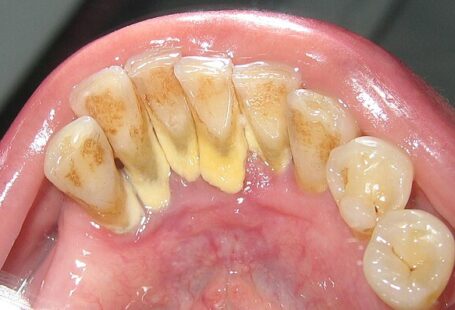Do you have persistent dental pain? Does it hurt to chew? Utilize our helpful guide to the most common dental pain disorders to learn how to treat your toothache.
A persistent toothache is among the most bothersome things. When it strikes, it can be quite challenging to ignore. Because you breathe, eat, and communicate via your mouth, even a slight toothache can significantly affect your day-to-day activities.
There is just one thing you can do if you have a toothache: go to the dentist. They are the only ones capable of determining the actual problem.
Even in the best-case scenario, using painkillers for a toothache won’t last very long.
You must act quickly to address the fundamental problem that is generating the suffering.
Most toothaches should be avoidable if you take care of your teeth and have them cleaned regularly. But it’s helpful to know what a toothache can indicate if you’re feeling one.
Here’s how to self-diagnose tooth discomfort so you can describe it to your dentist.
Six types of typical dental pain
There are numerous kind of dental discomfort. While some toothaches come and go in waves, others are chronic. Understanding your feelings will do more for you than merely aid in self-diagnosis. It can help you talk to your dentist so they can figure out what the best course of action is for you.
Periodontal Waves of Pain in the Tooth
This tooth pain feels more like an irregular jabbing or stabbing within one or more teeth than than an ache. You typically experience this when moving your mouth.
This form of tooth pain can be made worse by talking, opening your mouth, and chewing. This type of tooth pain comes and goes, but when it does, it is excruciatingly painful. Additionally, a crack, cavity, or abscess may be the cause of your sporadic tooth pain.
Temperature Sensitivity of Sharp Tooth
Tooth sensitivity will feel like a sharp, stabbing ache that comes and goes. This one, though, is dependent on the temperature. When consuming hot soup or ice cream, you can feel this. In severe circumstances, acute tooth discomfort may even be brought on by chilly air.
It may result from a cavity or an abscess, just like stabbing pain, but it can also be brought on by hard brushing or gum recession. Tooth sensitivity to warmth could also be caused by enamel hypoplasia.
varieties of tooth pain
A dull, persistent toothache
The most typical kind of toothache is this one. Even though it’s typically relatively moderate, the persistent nature and deep, dull sensation might make it challenging to treat. For this kind of toothache, many people take over-the-counter pain relievers, but it is merely a band-aid and not a remedy.
In many cases, tooth decay or nerve damage is to blame for a persistent, dull toothache. Consult a dentist right away if you’re feeling this kind of discomfort because both of these are dangerous tooth conditions.
A severe stabbing pain
You should schedule an appointment with a dentist right away if you have a tooth that is causing you excruciating pain. particularly if your face has also enlarged. Your face swelling indicates a tooth abscess or infection. And the dentist needs to address that immediately.
Aches Only During Eating
Some people only have toothaches while eating. If opening and closing your mouth hurts, you can have dental fractures or tooth rot. Both of these necessitate an immediate dental visit.
Jaw pain behind the ear
This kind of discomfort is less frequent than the others. Usually, this kind of dental discomfort is caused by an impacted wisdom tooth. And you should have it checked.
Wisdom teeth frequently erupt from the gums in unnatural angles, which can damage your jaw and even the alignment of your teeth. It is best to talk to a dentist about having them extracted because leaving them in could result in lasting damage.
How to Deal with a Toothache
Visit a dentist. This is your best opportunity to get rid of your toothache for good.
In general, you can get away with not rushing out right away for a dental exam if your pain is sporadic and seems to come and go.
However, you must book a time in the near future for an appointment. On the other hand, if the pain is severe and continues, you should see a dentist right once.
What Takes Place If You Visit the Dentist for Tooth Pain
The dentist will employ one or more techniques during your session to diagnose the issue. The most typical examinations you might anticipate to help the dentist identify your issue are as follows:
X-ray: In order to check for abscesses, cavities, and other hidden issues, your dentist may decide to take an x-ray of your teeth. This simple technique shouldn’t take more than a few minutes to complete.
Visual inspection: If the issue is clear, the dentist can identify it simply by looking inside your mouth.
Percussion test: A straightforward percussion test might reveal the mouth’s most delicate regions. The dentist uses a finger or a specific tool to lightly tap on several teeth, which is as easy as it seems.
Biting pressure test: You’ll need to push your teeth firmly against a stick or applicator, then describe where the discomfort is most intense.
Cold air test: The dentist will gently blast a stream of cold air on your teeth to find any vulnerable or excessively sensitive spots.
The Seven Most Common Causes of Toothaches
The decay of teeth
Cavity is another name for tooth decay. When you let plaque (bacteria) eat away at your enamel, cavities develop. A dentist is the only one who can repair it because the outer covering of your tooth has been permanently damaged.
The pain may increase as the hollow grows larger. The pain may be unbearable as it eats away at the dentin (middle layer) in the direction of your nerves.
Cavities and dental decay create tooth pain that is simple to recognise. Ask yourself if the discomfort is constant or if it varies throughout the day in terms of intensity.
When you have tooth decay, the discomfort frequently grows greater in the morning and slightly better in the evening. However, eating things that are hard can cause a flare-up.
Pulp inflammatory disease
Pulpitis is the common name for this illness. It happens when the middle tooth tissue gets irritated and swollen. This inflammation stresses the gums and surrounding tissue and causes pressure to build up inside the tooth. A root canal operation is typically used to treat pulpitis. The disease must be treated as soon as possible because tooth pain might quickly become severe.
Fractures and Cracks
Biting down firmly on a hard item can fracture and split your teeth. In certain cases, these fissures are virtually invisible. You will only experience pain. There is no doubt that eating hard candy, popcorn, or ice increases the risk of this.
A broken tooth can cause discomfort ranging from mild ache to cold sensitivity. Your fractured tooth can be treated in a way that the dentist thinks is best.
Wisdom teeth have an impact
If a tooth’s natural movement is impeded, a tooth may become impacted. Additionally, wisdom teeth frequently get impacted.
They have a difficult time aligning with the other molars since they emerge much later than the rest of the adult teeth. When there isn’t enough room for them, wisdom teeth might get stuck under the gum and cause pain and soreness.
Gum Illness
An extremely significant dental issue is gum disease. The gum tissue that surrounds and supports your teeth is infected.
The gums may recede and lose their hold on the teeth as a result of this illness, leaving gaps and pockets between the teeth. Bacteria then accumulate in these pockets, making the tooth roots more susceptible to decay.
If gum disease is not treated, it can cause permanent tooth loss and gums to fall apart completely. In the worst situation, it might potentially result in heart disease.
Teeth that are delicate
Sometimes tooth discomfort is just a genetic matter. Some people’s teeth are delicate. This could be the issue if there are no symptoms of infection or decay but the teeth are still sensitive to temperature swings and cold air.
You don’t require treatment for this because it isn’t even a dental condition. Of course, as long as the teeth are structurally sound. The level of dental vulnerability can be managed with the aid of toothpaste with special formulations.
Different Roots
Sometimes tooth pain isn’t even related to a dental issue. Many individuals are unaware that a toothache can also be caused by issues in other sections of your body. especially in your sinuses, ears, and nose. The upper row of teeth are easily impacted by sinus infection or congestion.







